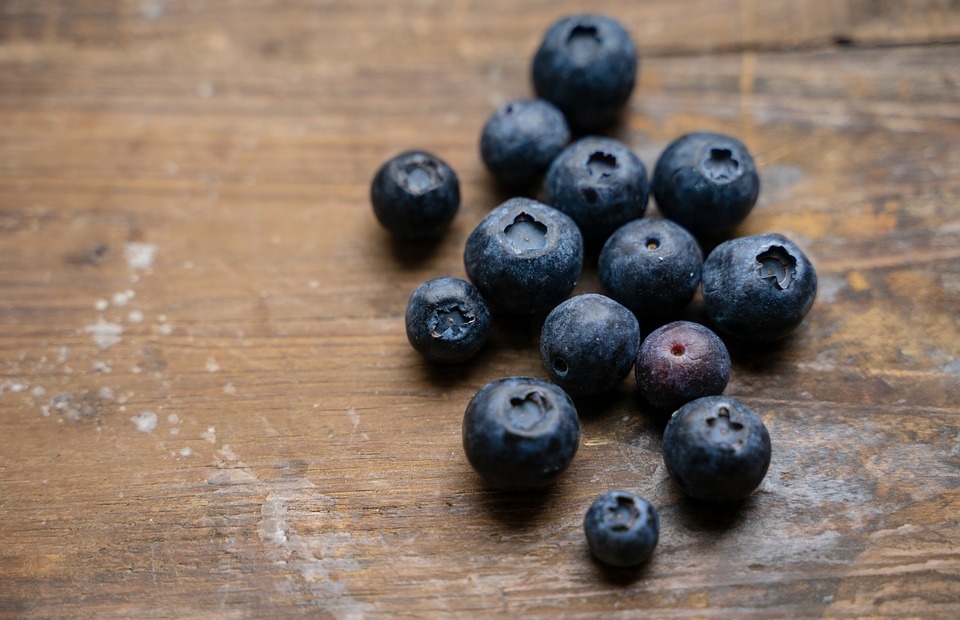This comprehensive guide explores the safety and benefits of blueberries for dogs, offering insights into appropriate serving sizes, potential risks, and how to incorporate this nutritious treat into your canine companion's diet. Whether you're a seasoned dog owner or a new pet parent, we'll cover everything you need to know to ensure your furry friend enjoys blueberries safely and healthily.
Part 1: The Nutritional Powerhouse of Blueberries

1.1. A Bounty of Benefits for Dogs
Blueberries are an excellent source of antioxidants, vitamins, and minerals that can contribute to your dog's overall health and well-being. These tiny fruits offer a wealth of benefits that can support your canine companion's immune system, digestion, and even their mental sharpness.
- Antioxidants: Blueberries are packed with antioxidants, such as anthocyanins, which help protect cells from damage caused by free radicals, boosting your dog's immune system and reducing the risk of chronic diseases like cancer and heart disease. These antioxidants also contribute to healthy skin and coat.
- Vitamin C: This essential vitamin supports collagen production, strengthens the immune system, and promotes wound healing. It's also crucial for healthy gums and teeth.
- Vitamin K: Crucial for blood clotting and bone health. Vitamin K also helps with the absorption of calcium, which is vital for strong bones.
- Fibre: Dietary fibre promotes healthy digestion, regulates bowel movements, and supports gut health. Fibre also helps to keep your dog feeling full, which is beneficial for weight management.
- Manganese: This mineral contributes to bone formation, cartilage health, and wound healing. Manganese also plays a role in energy production and metabolism.
1.2. Blueberries: A Natural Treat for Dogs
Blueberries are a natural, low-calorie treat that can be a healthier alternative to processed dog snacks. Their sweet taste makes them a rewarding snack that can be used for training or as a special treat. Unlike many commercial treats, blueberries are free from artificial colours, flavours, and preservatives, which can be harmful to dogs.
1.3. Blueberries: A Delicious Addition to Your Dog's Diet
You can add blueberries to your dog's food or give them as a standalone snack. Be sure to consult with your veterinarian to determine the appropriate amount for your dog's specific needs and size. If your dog is picky, you can try incorporating blueberries into their favourite meals, like yogurt, cottage cheese, or even homemade dog biscuits.
Part 2: Are Blueberries Safe for Dogs?

2.1. The General Safety of Blueberries for Dogs
Blueberries are generally safe for dogs in moderation. However, as with any new food, it's essential to introduce blueberries gradually and observe your dog for any adverse reactions.
2.2. Potential Risks and Precautions
While blueberries offer many benefits, it's vital to be mindful of potential risks:
- Overfeeding: As with any treat, overfeeding blueberries can lead to digestive upset, diarrhoea, or weight gain. It's crucial to stick to the recommended serving size and avoid giving your dog large quantities of blueberries at once.
- Sugar Content: Blueberries contain natural sugars, so they should be given in moderation, especially for dogs with diabetes or weight management concerns. Keep in mind that blueberry varieties can differ in their sugar content, so it's always a good idea to choose low-sugar options whenever possible.
- Pesticide Residues: Opt for organic blueberries or thoroughly wash conventionally grown ones to minimise pesticide residue. This is especially important for smaller dogs, as they are more susceptible to the effects of pesticides.
- Choking Hazard: Whole blueberries can be a choking hazard, particularly for small dogs. It's best to offer blueberries cut in half or quarters. You can also consider freezing blueberries, which can help to make them softer and easier to chew.
- Allergic Reactions: While rare, some dogs may be allergic to blueberries. Signs of an allergic reaction can include itching, redness, hives, vomiting, diarrhoea, or difficulty breathing. If you notice any of these symptoms after feeding blueberries to your dog, discontinue the treat and contact your veterinarian immediately.
Part 3: Serving Blueberries to Your Dog

3.1. Determining the Right Serving Size
The appropriate amount of blueberries for your dog depends on their size and weight. As a general guideline, start with a small amount, such as 1-2 blueberries for small dogs and 5-10 for larger breeds. You can gradually increase the amount if your dog tolerates it well.
3.2. Feeding Frequency
It's generally recommended to offer blueberries as an occasional treat, rather than a daily snack. Limit blueberries to a few times per week to avoid overfeeding and potential digestive issues.
3.3. Preparing Blueberries for Your Dog
- Thoroughly wash: Wash blueberries thoroughly to remove any dirt or pesticide residues. Rinse them under cool running water and pat them dry with a clean paper towel.
- Cut into smaller pieces: Cut larger blueberries into halves or quarters to make them easier to swallow and reduce the risk of choking. This is especially important for smaller breeds.
- Freeze for a refreshing treat: Frozen blueberries can be a fun and refreshing treat, especially on hot days. The freezing process can also soften the blueberries, making them easier to chew.
Part 4: Choosing the Right Blueberries for Your Dog
4.1. Organic Blueberries: A Safer Choice
Choosing organic blueberries reduces the risk of pesticide residues, making them a safer option for your dog. Organic blueberries are grown without the use of synthetic pesticides, herbicides, or fertilizers, which can be harmful to dogs.
4.2. Fresh vs. Frozen Blueberries: Which is Better?
Both fresh and frozen blueberries are suitable options for dogs. Fresh blueberries are generally more palatable, while frozen blueberries can offer a refreshing treat, especially during warm weather. Frozen blueberries also tend to be a bit softer, making them easier for dogs to chew.
4.3. Avoiding Blueberries with Added Sugar or Preservatives
Avoid giving your dog blueberries that have been sweetened or contain preservatives. These ingredients can be harmful to your dog's health. Stick to plain, unsweetened blueberries that are free from added sugars and preservatives.
Part 5: Incorporating Blueberries into Your Dog's Diet
5.1. Blueberries as a Training Treat
The sweetness of blueberries makes them an excellent reward for training. Their small size allows for easy handling and portion control. Blueberries can be an effective alternative to commercial dog treats, which are often high in calories and artificial ingredients.
5.2. Blueberries as a Topping for Dog Food
Adding blueberries to your dog's food can add flavour and nutrients. Sprinkle a few blueberries on their meal for an extra boost of antioxidants and flavour. This is a great way to encourage picky eaters to try new foods.
5.3. DIY Blueberry Treats for Dogs
You can create homemade blueberry treats for your dog using a simple recipe:
- Ingredients: 1 cup blueberries, 1 cup rolled oats, 1/2 cup peanut butter, 1 egg, 1/4 cup water
- Instructions: Preheat your oven to 350°F. Combine all ingredients in a bowl and mix well. Spread the mixture evenly on a baking sheet lined with parchment paper. Bake for 15-20 minutes or until golden brown. Let cool completely before breaking into smaller pieces.
Part 6: Monitoring Your Dog's Reaction
6.1. Observe for Signs of Digestive Upset
It's essential to monitor your dog's reaction to blueberries, especially when introducing them for the first time. Watch for signs of digestive upset, such as diarrhoea, vomiting, or gas. If you notice any of these symptoms, it may be a sign that your dog has eaten too many blueberries or that they are sensitive to the fruit.
6.2. Adjust Serving Size Based on Your Dog's Reaction
If your dog experiences any adverse reactions, reduce the amount of blueberries you give them. If the symptoms persist, consult your veterinarian.
Part 7: When to Consult Your Veterinarian
7.1. If Your Dog Exhibits Any Unusual Symptoms
If you notice any unusual symptoms after your dog has eaten blueberries, such as vomiting, diarrhoea, or loss of appetite, contact your veterinarian immediately.
7.2. If Your Dog Has Pre-Existing Health Conditions
If your dog has pre-existing health conditions, such as diabetes or kidney disease, consult your veterinarian before introducing blueberries into their diet. Your veterinarian can advise on the appropriate amount of blueberries for your dog and make sure they are safe for their specific health needs.
Part 8: FAQs
8.1. Can puppies eat blueberries?
Puppies can enjoy blueberries as a treat, but it's best to introduce them gradually and in small amounts. Start with just a few blueberries and observe your puppy's reaction. Consult your veterinarian for specific recommendations for your puppy's age and size.
8.2. How many blueberries can a dog eat?
The appropriate amount of blueberries for your dog depends on their size, weight, and health condition. Start with a small amount and observe their reaction. A good guideline is to offer 1-2 blueberries for small dogs and 5-10 for larger breeds, a few times per week.
8.3. What are the signs of a blueberry allergy in dogs?
Signs of a blueberry allergy in dogs can include:
- Skin reactions, such as itching, redness, or hives
- Digestive upset, such as vomiting, diarrhoea, or gas
- Respiratory issues, such as coughing or wheezing
If you suspect your dog may be allergic to blueberries, stop giving them the fruit and contact your veterinarian immediately.
8.4. Can dogs eat blueberry leaves or stems?
It's best to avoid feeding your dog blueberry leaves or stems, as they can be toxic to dogs and may cause digestive upset. Stick to the fruit itself and avoid feeding any other parts of the blueberry plant.
8.5. Can blueberries be used for dog dental hygiene?
While blueberries can be a healthy treat, they are not a substitute for proper dental hygiene. Regular brushing and professional dental cleanings are essential for maintaining your dog's oral health.
8.6. Are blueberries good for older dogs?
Blueberries can be beneficial for older dogs due to their antioxidant properties. These antioxidants can help to support the immune system and reduce inflammation, which is common in older dogs. However, it's essential to monitor their intake and ensure they are not overfed.
In conclusion, blueberries can be a nutritious and delicious treat for your furry companion, offering a range of health benefits when given in moderation. By following the guidelines outlined in this article, you can ensure that your dog enjoys this sweet treat safely and healthily.
Everyone is watching
-

Can Dogs Eat Bananas? A Guide to Safe Treats
DOGS & PUPPIESThis comprehensive guide will delve into the world of canine nutrition, focusing on the popular question: can ...
-

Can Dogs Eat Oranges? (Is It Safe or Toxic?)
DOGS & PUPPIESThis article delves into the question of whether dogs can safely consume oranges. We'll explore the nutrition...
-

Can Dogs Eat Grapes? The Shocking Truth About This Fruit
DOGS & PUPPIESThis article delves into the controversial topic of grapes and dogs, exploring the potential dangers associate...
-

Why Do Dogs Eat Poop? Understanding Coprophagia in Dogs
DOGS & PUPPIESThis article delves into the perplexing phenomenon of coprophagia, the act of eating faeces, in dogs. We explo...
-

Can Dogs Eat Shrimp? A Guide to Safety and Risks
DOGS & PUPPIESThis comprehensive guide dives into the world of shrimp and dogs, exploring the potential benefits and risks a...
